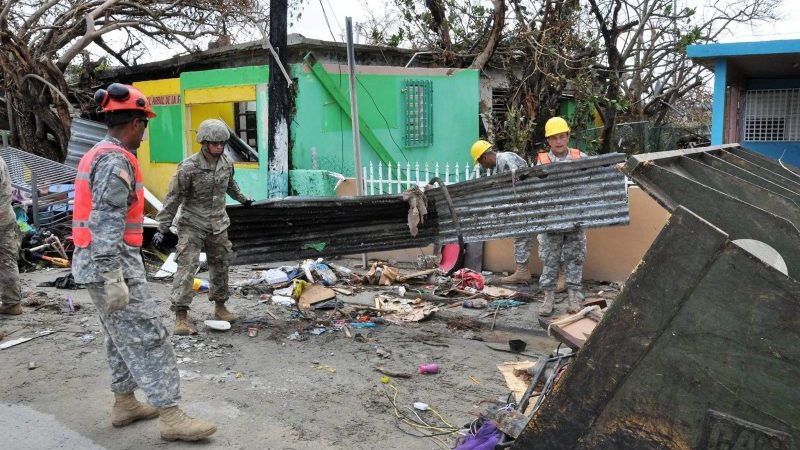2017 has supplied enough material for a dozen Hollywood disaster movies: islands flattened by cyclones in the Caribbean and the Pacific, thousands killed in flooding across South Asia and West Africa, highways turned into rivers in parts of the US.
There is a theme. While severe weather events have occurred throughout history, in many cases it can be shown that human-caused climate change has made them more frequent and severe. The poorest regions in the world are suffering the most, leading the IMF to raise concerns about the ability of poor countries to cope.
Who can deliver a happy ending to these tales of adversity? They may not be obvious heroes, but negotiators convened by Fiji in the German riverside city of Bonn from next week have a key role to play.
At UN climate talks, these harmful impacts of global warming that cannot be prevented are described as “loss and damage”. In 2013, the Warsaw International Mechanism (WIM) was set up to address the issue. In 2015, it was enshrined in article 8 of the Paris agreement.
In theory, the groundwork for a concerted effort on loss and damage has been laid. The WIM’s executive committee met six times over the last two years. It has established an expert group on non-economic losses, a task force on displacement, with more expert groups to come.
But there are problems. The WIM has no money behind it, leaving little room for the expert groups to produce meaningful work. Civil society heavily criticized its upcoming work plan for lacking ambition. Despite some hope-inspiring initiatives, national self-interest and distrust still appear to drive the agenda more than the spirit of solidarity that was felt in Paris. Loss and damage is still a sideshow, with no regular agenda item at the regular technical meetings that prepare the grounds for political negotiations.
Here is what leaders at the first UN climate talks to be led by a small island nation – Fiji – can do to change that.
Bonn Cop23 climate talks
When? 6-17 November, 2017
Where? Bonn, Germany
What? A meeting of 197 parties to the UN Framework Convention on Climate Change, where the implementation of the Paris climate agreement will be the major point of negotiations.
Not just Donald Trump news! Climate Home will be taking its biggest ever team to the talks.
How to keep up? Sign up to Climate Home’s newsletter, Facebook and Twitter feeds for the most in-depth, dedicated reporting from this critical meeting.
Firstly, it should move the issue into the political spotlight by establishing a high-level segment on loss and damage, to allow governments to highlight their concerns and motivate urgent action. As an immediate step, the WIM must be strengthened with a dedicated budget. It must turn its store of knowledge into tools for action, to be disseminated to those who need them.
Secondly, loss and damage needs to be integrated into other strands of the negotiation, including capacity building, technology and the global stocktake. Observational data must become available and accessible in particularly vulnerable regions as data for such regions continues to be scarce but needed for decision-makers. The WIM could be asked to support such process through developing a public relations campaign to raise awareness of loss and damage at all levels, but targeted specifically at the scientific community.
Thirdly, the scientific basis for loss and damage must be formally brought into the talks. There is now significant information available on loss and damage, including valuable insights into adaptation limits, residual risks and impacts as well as the information required to assess and quantify such losses. However, this is not being recognized.
At the last meeting of the UN climate science panel in September, government representatives could not agree to include loss and damage in the outline of its next assessment report, despite the fact that there are over a hundred of papers on the subject. It is time that this obfuscation and denial ended: the time is ripe for a dedicated special report by the Intergovernmental Panel on Climate Change (IPCC).
Finally, the sad truth is that much worse is to come. The IPCC’s overview of residual risks shows that risks will remain high even with steep emissions cuts and adaptations to the impacts of climate change. Large scales of dedicated support to cope with residual impacts will be needed.
Financial sources need to be tapped, or new ones created, without diverting from the dire need for funding of clean development and resilience. That is not going to happen overnight, but must be made a central theme of the WIM.
Ok, so these steps might not be the stuff of a Hollywood blockbuster. But they would represent a positive outcome for this round of talks. And the sequel is already in the making…
Olivia Serdeczny is a research analyst at Climate Analytics, advising the Least Developed Countries and Small Island States in UNFCCC negotiations, with a focus on loss and damage.
